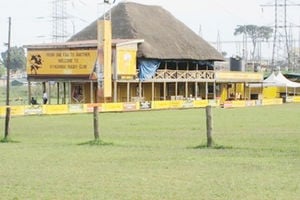
A reveller enjoys a fun moment at Bakiga Nation event last weekend. PHOTO/courtesy
We came to Kampala for university, most of us. We were born and raised on farms in the countryside, which means that we do not look at child labour the same way you do.
We planted, weeded and harvested crops before we could say ‘crops’. By age six, we could help a goat give birth and tie a cow’s legs and milk it by age nine. We rode on backs of rams for fun because we did not have toy bicycles. We wore oversized shirts not because we were so gangster, but because we had no shorts underneath.
Brewing tradition
For many of us, brewing was a huge part of what we did on the farm since childhood. In many parts of Uganda’s countryside, alcohol was and still is not as taboo as you may assume.
For instance, in some parts of Kigezi, pregnant women drink a little waragi regularly because they believe it helps the baby comes out with a clear skin.
In some of these areas, allowing a child a sip of the good stuff is totally acceptable. Politically incorrect as it may be, for some of us, the first time we were knocked out was when we stole a little too much brew and drunk it as youngsters.
We grew up with local brew and it somewhat became part of our identity. These local brews are part of what defines our roots. Many parents have afforded their children’s tuition by selling local brew. Those who grew up in cassava growing regions, learnt how to brew alcohol out of it. Those who grew up in sorghum growing areas learnt how to make alcohol out of it and those from banana growing areas did the same.
But when we came to the city, we left our beloved beverages back home and were forced to make do with exotic drinks that we find hard to connect with.
We may look normal, but deep down we are burning with nostalgia for local brews. And some business oriented people recently figured it out and made the right moves. Tribal festivals such as Bakiga Nation, Batooro Kwegonza, Kadodi Karnival, and so many others have been crafted to cater to our nostalgia for our roots.
Bakiga Nation
Last Sunday, on the eve of Martyrs’ Day, all roads led to Lugogo Grounds where, Bakiga Nation, one of the biggest and longest-running of such tribal festivals was hosted.
Less than a month earlier, a very well-attended Kadodi Karnival for our Elgon area friends had been hosted in UMA show grounds, not far from here. It is a huge trend.
Doors were open by 10am and by midday a sizable number of Bakiga folks had started flocking in. By now, traders had already ferried in their merchandise, meats were already marinating in large buckets and the ticketing team was at the gate. By 2pm, lines were already snaking along the roads outside as the ticketing team could not work fast enough.
More than 90 percent of all the stalls in these festivals sell nothing but local brews because it is what the revellers are here for. For example, at Bakiga Nation last Sunday, traders had travelled from Muhanga, Nyarushanje, Kambuga, Kamwezi and other parts of Bakiga Nation (read Kigezi), bringing with them gwagwa, enturire, omuramba, and local waragi to sell to the sons and daughters of the soil, who now live in Kampala.
All these local brews, gins and wines were on sale for top dollar, but no one was complaining. It is a small price to pay for getting transported back in time and space.
Gospel music
Other than alcohol, the other permanent fixture in festival situations anywhere is the music, of course. But as expected, the music played at these particular events is village music, most of which is gospel music.
The last few decades have seen a rise in popularity of gospel music in the countryside, so much so that secular music is such a tiny segment of what we call ‘our music’. The phenomenon is so strong that it follows us to the city. Bakiga Nation’s tagline is ‘Rukundo Egumeho’ which happens to be a gospel song title.
Gospel music is huge in the countryside. For instance, a mid-level gospel musician in the west will enjoy a more widespread name recognition among the population than a superstar like Ray G.
That is how big gospel music is back home. So at Bakiga Nation, just like in all other similar festivals, we dance to gospel music as we get wasted on local brew. A beautiful irony.




